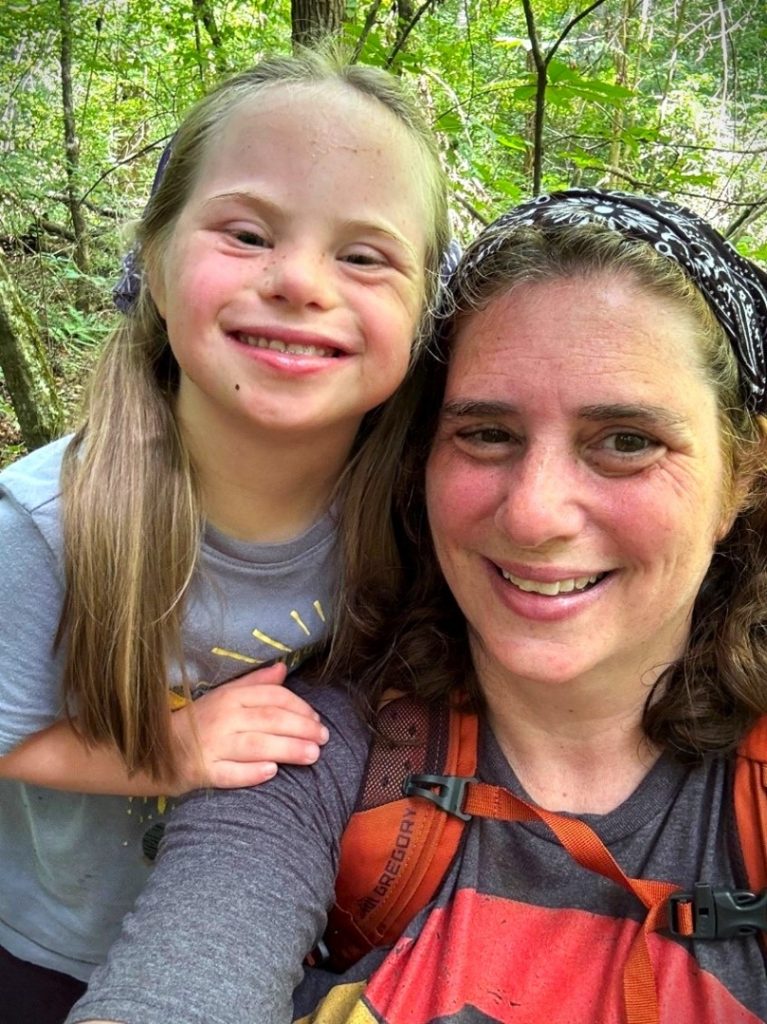October was Down Syndrome Awareness Month
By: Kristin Jones
When I was 12 weeks pregnant and 39 years old, we found out that Wren was going to be born with Down syndrome. As is the case for most families, this news was a surprise to us, but for me there was a lot more to process.
At that point in my life, I had been a pediatric occupational therapist for 17 years and many of those years had been working at the public charter school, which my older two children attended. I worried about potential health concerns, could our family continue our active lifestyle in nature, could I keep working at a job I loved? I worried so much, I took the joy out of my last pregnancy.
The minute Wren was born, unexpectedly six weeks early, and they placed her in my arms, all those worries melted away. She was just my baby that needed all the same love and care as my older children. Once we busted out of the neonatal intensive care unit, we quickly found that Wren was happy to go along on family adventures like camping, hiking and backpacking. She even took some of her first steps on the Appalachian Trail. I truly believe this has helped Wren grow into a physically strong, brave, and independent little girl.
Fast forward to age five and kindergarten. Wren has a natural love of life and learning. When we are out in nature, cooking, or in the kitchen, she thrives on being independent. One of Wren’s favorite things to do on the weekends is cooking Daddy an egg on the stove by herself.
Working at the same school as Wren and being an integral part of the school Exceptional Children’s Service team, I have seen firsthand how her level of independence is different in this fast paced, loud, overstimulating general education environment, and it made me think deeply about the whys of what we do at school.
I imagine I am one of a few parents who get to be part of both worlds, which I have found to be both a blessing and one of the hardest experiences of my life. I get to witness Wren having real relationships with her peers and learning amazing things in the classroom. I have also watched her struggle, which gives me the opportunity to problem solve with her team.
Being both Wren’s teacher and mom, has come in handy most days. I am thankful for a school team that honors both of my perspectives. Not only has this helped Wren directly, but it has also benefited so many other students with similar needs.
As a team, we found new ways to be able to access literacy without needing to write with a pencil, alternatives to verbal communication too, so a student can share their knowledge on a subject while honoring all forms of communication. We can follow a student’s individual interests to make learning come alive for them and above all, foster a sense of felt safety and connection. Not only has this changed how our students participate and have authentic experiences throughout the school day, but it has also given teachers and support staff more confidence with including all students in all opportunities.
The more I researched as Wren’s mom and as a professional, the more I wanted every parent and professional to know. It began as the offer to train the entire staff at my school about neurodiversity to support students in the classroom, then developed into new interventions and courses from kindergarten to age 22.
I dreamt of Wren’s future and how I could make sure she had the opportunity to lead a self-determined life.
Over the period of a few years, I created a high school class that helped the students learn about how their own brain and bodies learned best, what activities make them feel comfortable or uncomfortable, what they see as their strengths, created a sense of disability pride, and most importantly that they have the right to say “no.”
Once those concepts were established, we moved onto students learning about each part of their own individualized education programs (IEPs), making significant contributions to their IEPs, and learning how to create and accomplish their own goals. They set and achieved meaningful goals, such as having a party to make more friends “like me” and taking a theater class outside of school as a step towards a job in acting.
These students are now making real decisions about their futures, not just making a choice from a list of opportunities made by someone else. The success of this class and the other changes across the school has led me to many other opportunities to create presentations and classes reaching a much broader audience of parents and professionals across the country.
I want all parents to know that they have the greatest understanding of their child’s strengths and needs, that they are the most important member of the IEP team, along with their child. When Wren was born, I promised her over and over, “I will never ask you to change, but I am going to change the world for you”, this is my way of keeping that promise.
This story is not about me, nor should it be. I have only started Wren’s story for her, and I hope she will feel the love and confidence in herself to create the rest of the story one day. I am so lucky to have a front row seat in Wren’s journey.
Blog articles provide insights on the activities of schools, programs, grantees, and other education stakeholders to promote continuing discussion of educational innovation and reform. Articles do not endorse any educational product, service, curriculum or pedagogy.


Wow! This is amazing and so inspiring. I’d like to know more about your course and training around student self-determination! Thanks for sharing your beautiful story!
Thank you for sharing! It was a moving reminder to all educators of the tremendous responsibility we have to our students. We must design meaningful learning and reflect on ways to improve systems that benefit our students and communities.